On October 12-13, 2018, International Conference “Criminological Research and Its Implementation in Conditions of Transformational Processes: National and International Perspectives” was held on the basis of the Faculty of Law at Polotsk State University. The following institutions organized and conducted the event: the University of Bialystok (Poland), Luhansk State Univesity of Internal Affairs named after E.O. Didorenka (Ukraine), SRH University Heidelberg (Federal Republic of Germany) and Institute of Criminology at Heidelberg University (Federal Republic of Germany).
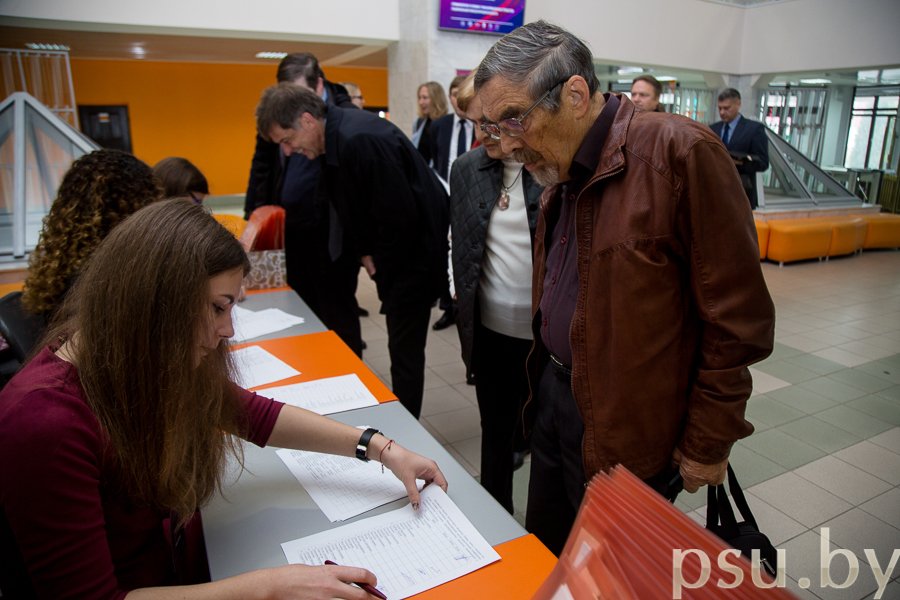
Prominent criminologists and junior researchers from Germany (Freiburg, Heidelberg, Hamburg, Vechta, Gotha), Poland (Bialystok), Lithuania (Kaunas), Iran (Tehran), Ukraine (Severodonetsk), Belarus (Minsk, Polotsk, Novopolotsk) and Russian Federation (Saint Petersburg, Yekaterinburg, Veliky Novgorod) took part in the conference.
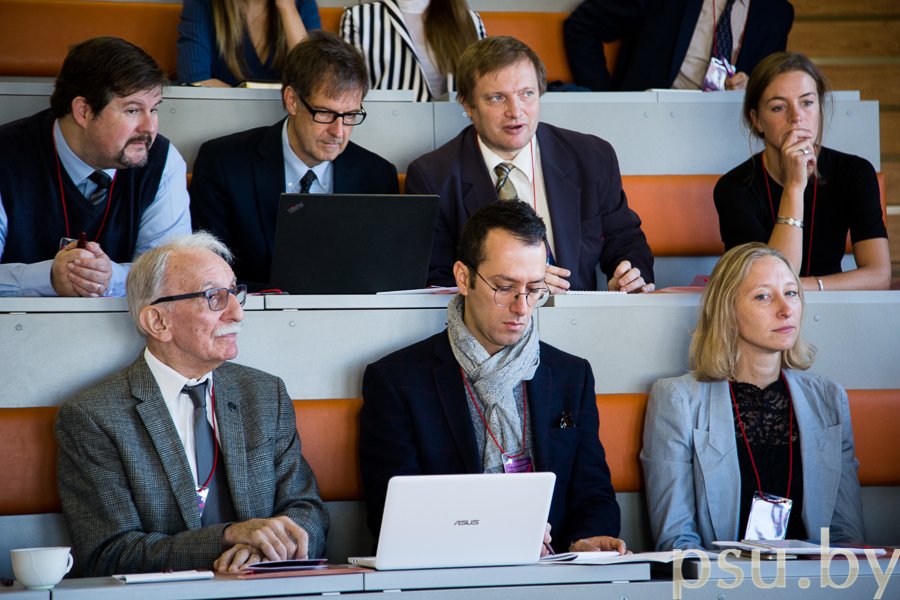
The idea of the conference originated from the partnership between the Faculty of Law at PSU and German education and research institutions. Helmut Kury visited our university last year and encouraged the faculty to develop a partnership with the Western scientific community. Besides, H. Kury was a volunteer and managed to find a German university, which was interested in cooperation with the Faculty of Law at PSU. It was SRH University Heidelberg, the Faculty of Applied Psychology. Then, on the basis of common scientific interests and desire to cooperate, an application under the program of academic exchange Erasmus+ was made. The European institutions supported it. This allowed organizing a conference. Later, the scientists specializing in criminological studies from other partner universities joined the event.
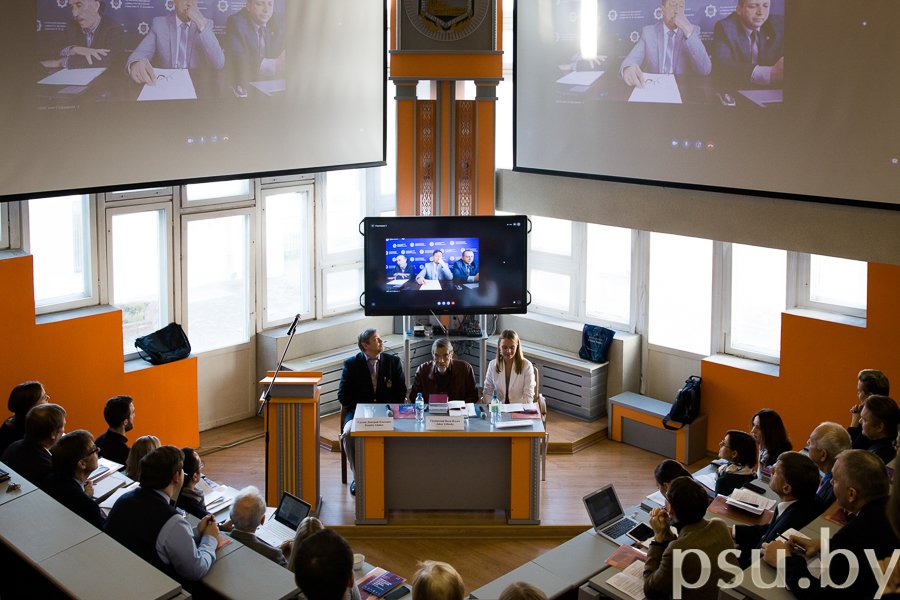
The aim of the conference was to discuss crime trends, its factors, development features of a crime situation in the conditions of social transformations and the implementation possibilities of the results received in the course of criminological studies.
The conference became a discussion platform where the criminologists from post-soviet countries could interact with the western researchers and find similarities of criminological problems. Scientific forums play the most important role in the life of scientists because the forums give the opportunity to exchange the research experience, publish their works getting external reviews and find partners for further research.
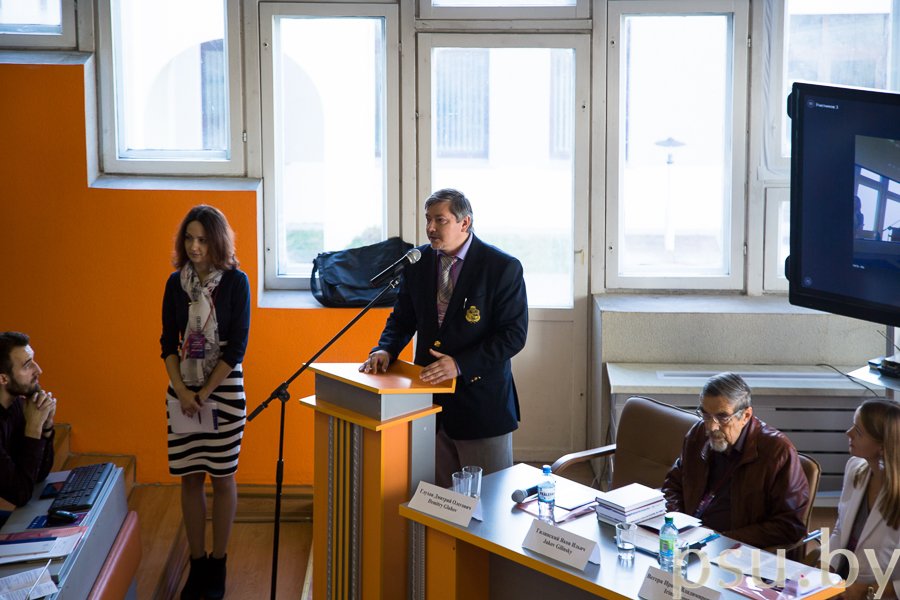
The following topics were discussed during the conference: connection of criminality with socio-economic transformations, family and milieu at the genesis of criminal behavior, connection of alcohol and drug consumption with crime, criminological characteristics of corruption-related crimes, public attitude and respond to crimes, effectiveness and limitation of criminal punishment, alternative measures of crime prevention including restorative justice and mediation in criminal proceeding.
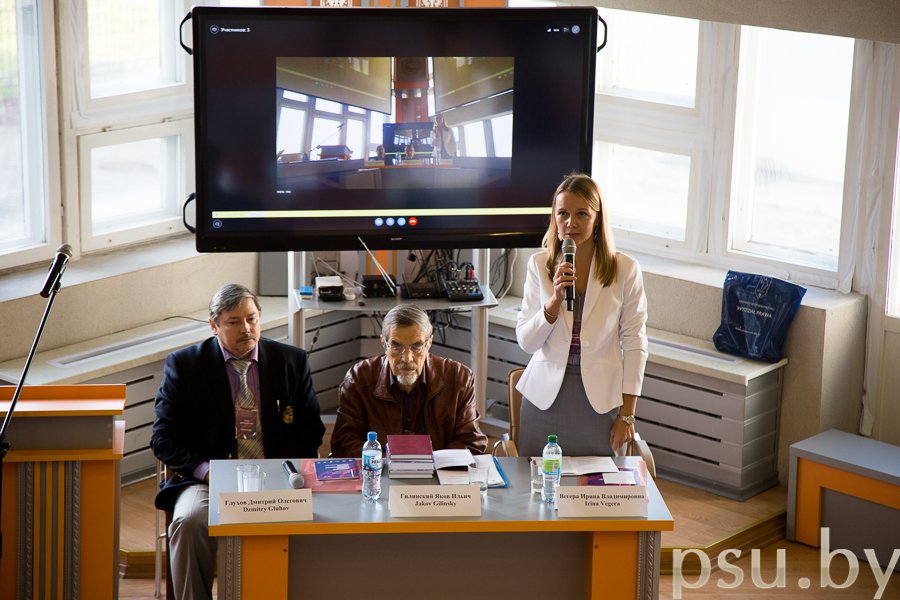
Katazhina Lyaskovska, professor at Law Faculty of the University of Bialystok, Doctor of Law (Bialystok, Poland): “My report deals with the problems of transformation in Poland over the last 30 years. This transformation happened in the three areas: social, political and economical. It influenced on the crime in our country.
It is my pleasure to visit the countries that border with Poland. It is a useful experience for me. I compare problems concerning criminology and criminal law and try to find good solutions to them, for example, in my country.
This is my first time at Polotsk State University. I feel comfortable here. The conference is organized in a very good way.”
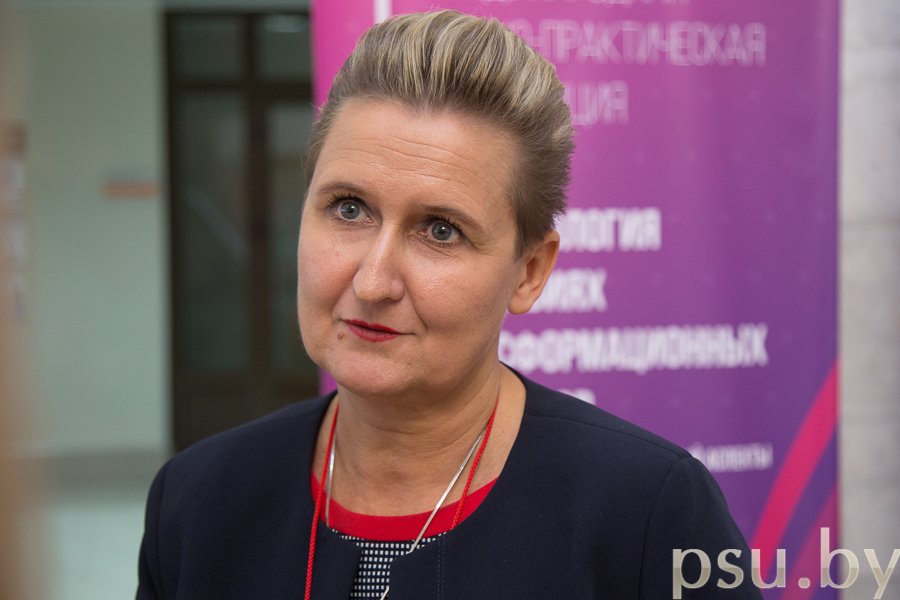
Yakov Gilinsky, professor of St. Petersburg Law Institute (branch) of the Academy of the General Prosecutor’s Office, professor of the Herzen State Pedagogical University of Russia, Doctor of Law (St. Petersburg, Russia): “Today I am speaking about postmodern society, its influence on crime, alcoholism, suicide and about crime in Russia, Belarus and other countries.
In my opinion, such meetings are very important for every researcher. It is a good chance to share experience and tell our colleagues about the situation with crime. I want to know their opinions.
This is my first time at Polotsk State University. It is my pleasure to be in Belarus.”
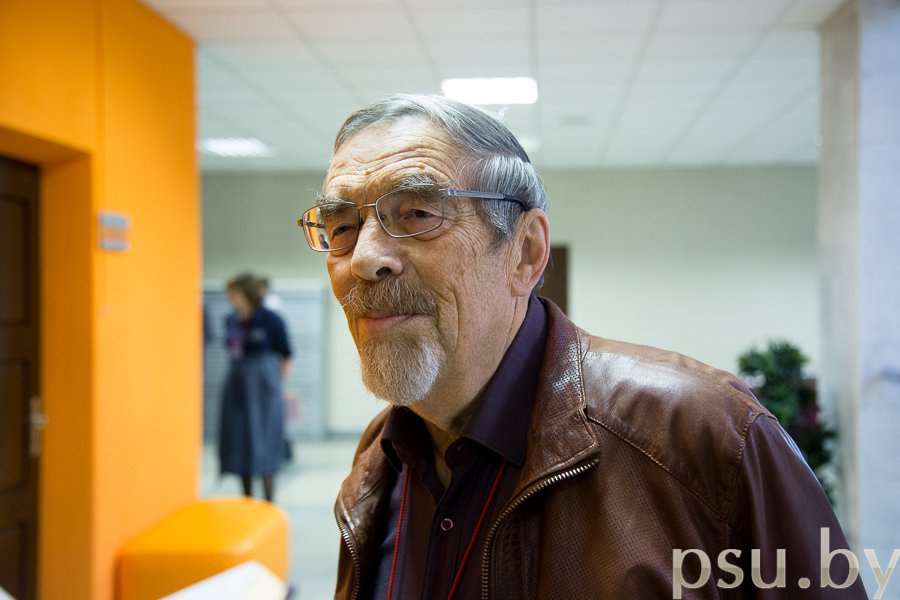
Kirill Titaev, senior researcher at the Institute for the Rule of Law at European University at St. Petersburg, PhD in Sociology (St. Petersburg, Russian Federation): “My report is devoted to different forms of the police work assessment using sociological survey. The matter is that the police work is assessed by the criterion of trust. Every person, who doesn’t even know anything about the police, may trust or not trust it. Consequently, we have an incorrect result. I will speak about other approaches, which are based on whether a person has gone, will go or is planning to go to the police, showing the advantages and disadvantages of the approaches using the data of the First All-Russian representative repository survey.
It seems to me that it is a very important conference. Such conferences used to be held at the University of Luhansk. Nowadays, this initiative is supported here, at Polotsk State University. The first session meets my expectations completely and I see that this conference has a huge potential.
Your university is very beautiful. As I am from Siberia, I feel comfortable in campuses. Such cities as Novopolotsk and Polotsk are like Angarsk and Shelekhov near my native city Irkutsk. It evokes a lot of pleasant memories.”
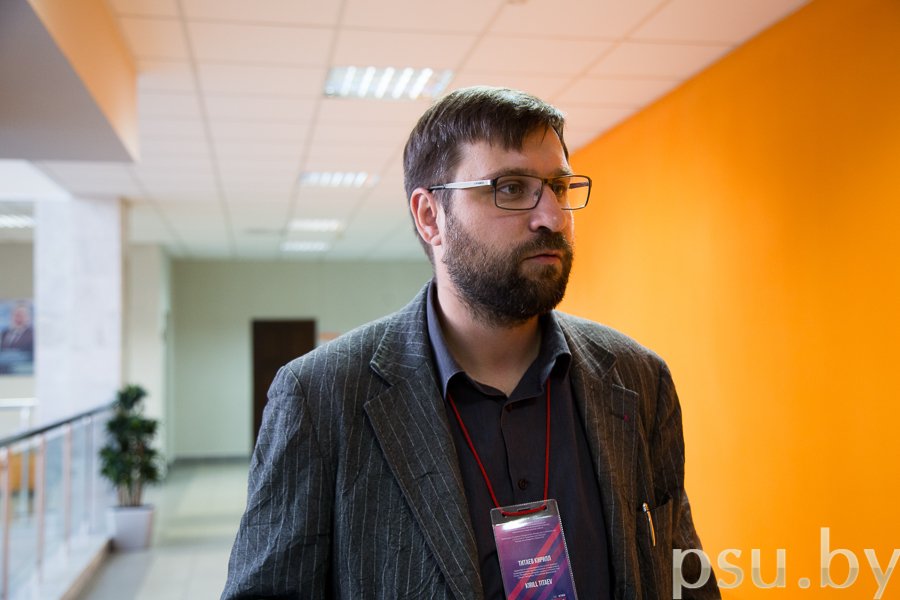
Olga Kalpinskaya, Head of the Department of Criminal Law and Criminology at Novgorod State University, PhD in Law, associate professor (Veliky Novgorod, Russian Federation): “Today I’ll present the results of a criminological research on paying bribes. For a year, the students of the Faculty of Law have been analyzing legal framework, carrying out sociological survey, analyzing the statistical data on sentences that had taken effect in case of persons who paid bribes. The results helped to comprise a specific system of prevention measures. Thus, the brochure “Legal Education of the Population” was created. The brochure is published on the government sites, on the site of Novgorod State University. Besides, we distribute it among all who care and fight against corruption crimes. The most surprising is that 10% of the respondents had positive attitude to bribery. Consequently, we can see that the presence of corruption-related crimes shows the society demands and drawbacks which exist in the normative regulations of social relations. When we, as citizens, violate the law, for example, because there are no regulations for your case, we confirm once again that criminality is the mirror of the social development, which should be analyzed to propose more effective measures to reduce corruption related crimes in future.
I would like to thank the organizers and the initiators of the conference. The format is very interesting; scientists from different countries take part in it. When we share our opinions on the crimes and try to analyze the causes, we get new things to think about. This experience sharing will give us the opportunity to have a more detailed view on criminology, criminality and the results of new research. Besides, it will give impetus to law-making initiatives and developing the new ways of crime prevention. In addition, it will give opportunities to study new elements of social relations, new systems that have appeared due to social processes transformations.
I am a regular participant of different conferences that are organized be the Faculty of Law at Polotsk State University. I want to say that the conferences are always well-organized and informative.”
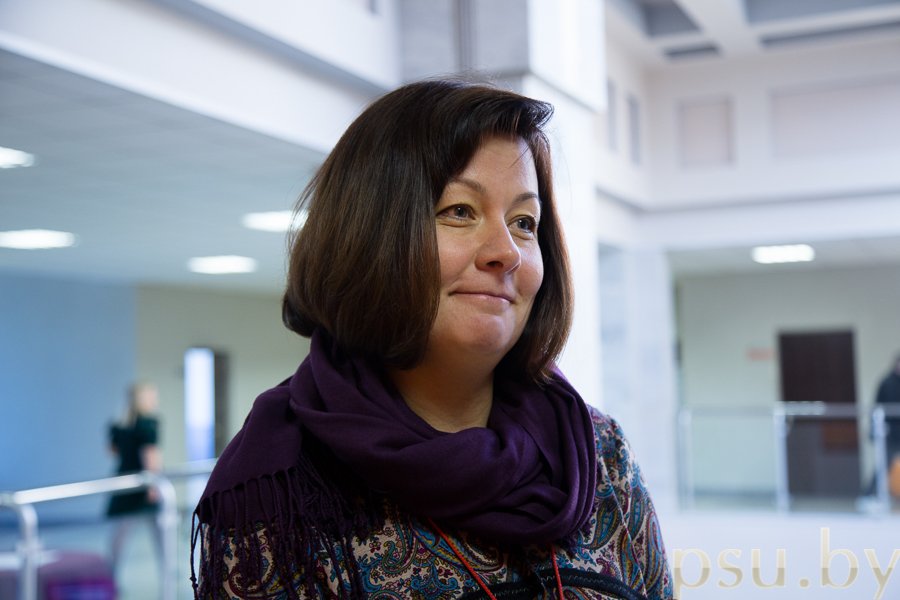
Edita Gruodytė, vice-dean at the Faculty of Law at the Vytautas Magnus University, Doctor of Law, professor (Kaunas, Republic of Lithuania): “Today, my colleague and I are making a presentation “Corruption Prevention: Measures Taken in European Union and at the Domestic Level”. It is always interesting to learn new information: how they live, what problems and questions they have, what they can share with international colleagues. This is a very informative conference because there are a lot of presentations from the representatives of different countries and we are happy about that.
We are here for the third time. We love your university very much because the people here are friendly and sociable. It is always interesting to communicate, we always find a common ground. Besides, there is a master’s degree student from your university taking her master’s course at our university.”
Saule Milchuvene, Associate Professor at the Law Faculty of Vytautas Magnus University, PhD in Law (Kaunas, Lithuania): “I teach European Law. Today it is very interesting for me to find out what current tendencies exist, in what way crime situation and law are changing in other countries and, of course, compare with the situation in Lithuania.
We are glad that PSU lecturers and students come to us under the ERASMUS programme. Last year I took part in this programme too.”
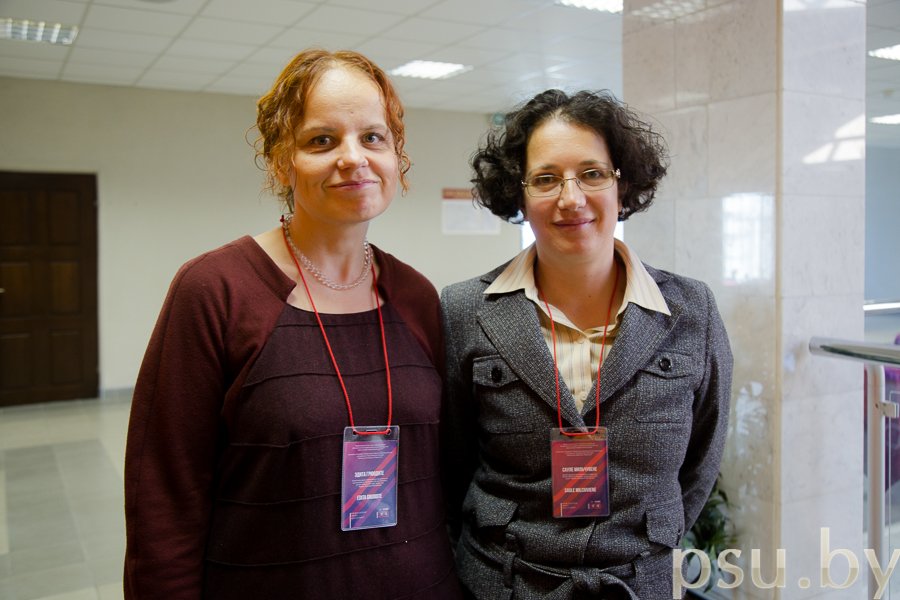
Alexander Zvonok, Associate Professor at the Department of Social Studies and Humanities and Professional Psychology of Luhansk State University of Internal Affairs named after E. O. Didorenko, PhD in Psychology (Severodonetsk, Ukraine): “My report is about the issues of restorative justice. It is possible to restore justice in different ways. I’ll talk about mediation, which is one of them.
Today I hope to exchange the information, get new knowledge, and learn about the new tendencies in criminology and conflict resolution studies.
I’m here for the first time. It is very interesting here and the university is very beautiful. I hope for fruitful work!”
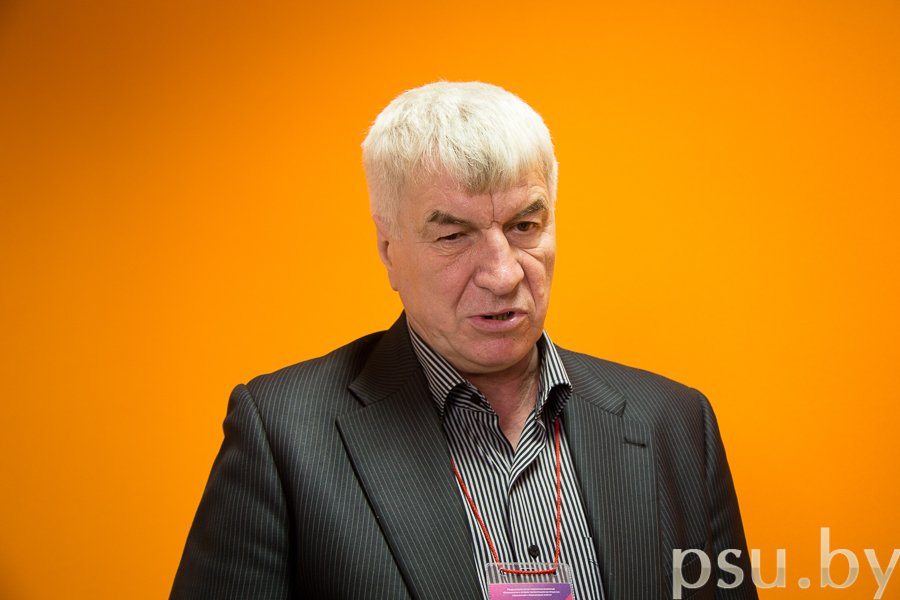
Alexandra Collon, a postgraduate student and junior researcher at the institute of criminology at the University of Heidelberg (Heidelberg, Federal Republic of Germany): “The title of my report is “Unemployment in Crime: Correlations and Latest Research”, so I will tell you about the influence of unemployment on crime and about the latest research in this field. I will talk about the current state of schools, the empirical research, and how you can argue combining both variables.
I expect interesting discussions because there are so many representatives of different nations. I’ve never been to Belarus or its neighboring countries before. I guess it’s very interesting to see the discussions and opinions towards my topic and towards the other topics.
Polotsk State University is a very beautiful university! Yesterday we had a tour here, in this building. We were shown, for example, the criminalistics laboratory. We don’t have anything like that in Heidelberg.”
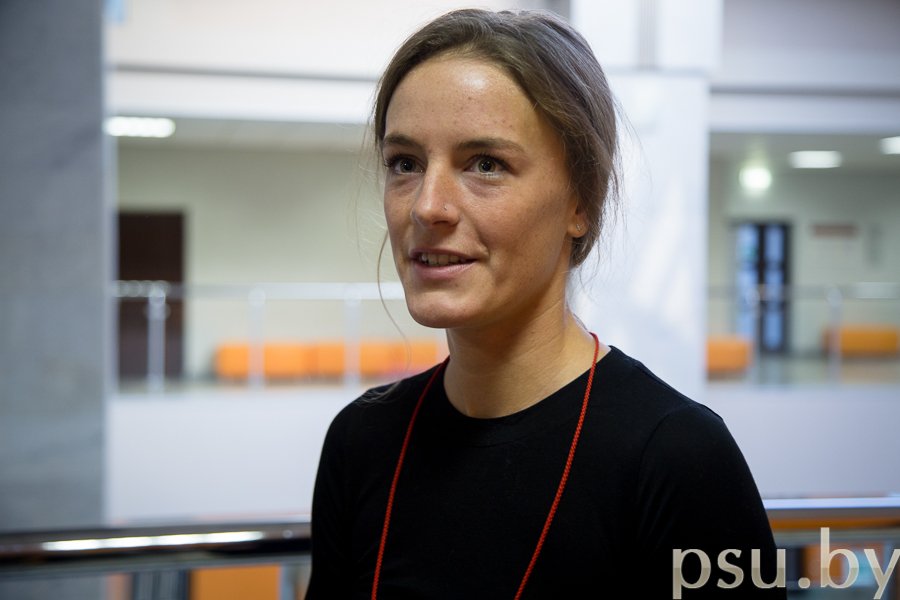
Barbara Horten, a postgraduate student and junior researcher at the institute of criminology at the University of Heidelberg (Heidelberg, Federal Republic of Germany): “I am writing a thesis on sociology. I’m very glad to be here. My report is connected with my thesis. It’s about the problem of the minors who commit crimes in peer groups. I organize meetings where we summarize the results to get the whole image.
I’m really lucky to be here. It’s my first time here, in Belarus. It’s a great experience to meet all the people, to see a different country and different people as well. It reminds me a little bit of Finland because of the lakes and the forests. The people here are so friendly and helpful. I feel comfortable here.”
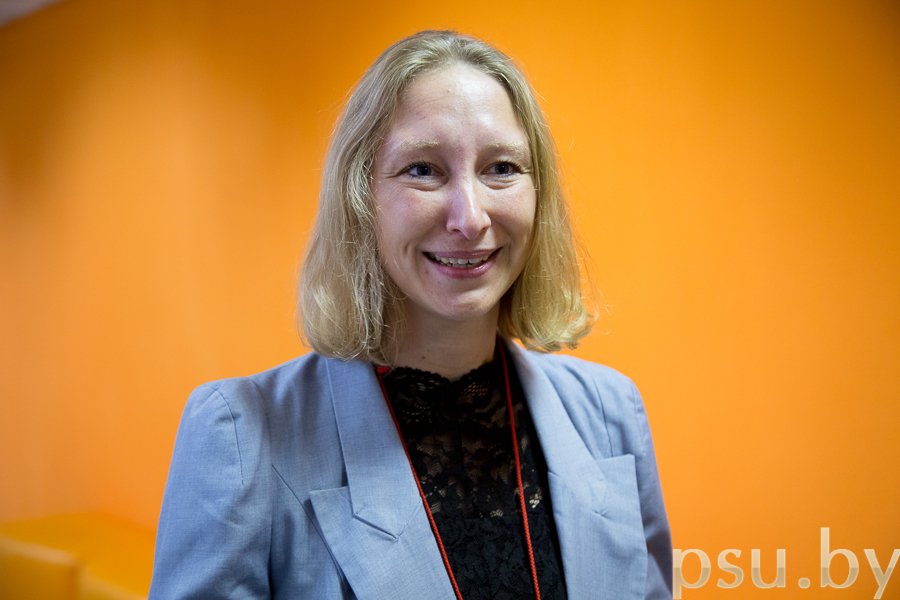
Hamidreza Nikookar, a lecturer of humanitarian sciences at the Central branch of The Islamic Azad University, Doctor of Philosophy (Tehran, Islamic Republic of Iran): “I’m a researcher at the Institute of foreign and international criminal law named after Max Planck (Freiburg, Germany). My research field is criminology of international crimes. I’ve been researching on the theory of crimes since 2014 and I still continue. The topic of my report is a link between the theory of crime and punishment, and how can the theory of crime influence the people’s minds and their thoughts about punishment. I’ve tested more than 200 students and I’m going to talk about the results.
It’s my first time in Belarus. I’m glad that I’m here, at Polotsk State University. Researchers and professors came to the conference to share their experience. Besides, if you want to learn more about Belarusian criminology system, it’s easier to ask a question than read a book. And now, when I contact with people face to face, I can learn more about Belarusian criminology. Moreover, I can invite the people to Iran. It would be a good chance for us to find new colleagues.
I’m from Tehran. 15 million people live there. I would prefer to stay in a very nice city as Polotsk and Novopolotsk. I study in Freiburg. Freiburg is small and nice, but when I learnt that just 10 million people live in Belarus, I was shocked. I would like to stay here, because it is very beautiful here, especially in autumn. I’m going to tell my friends about it. I’ll make a post on social media and invite my colleagues to come here to contact with PSU.”
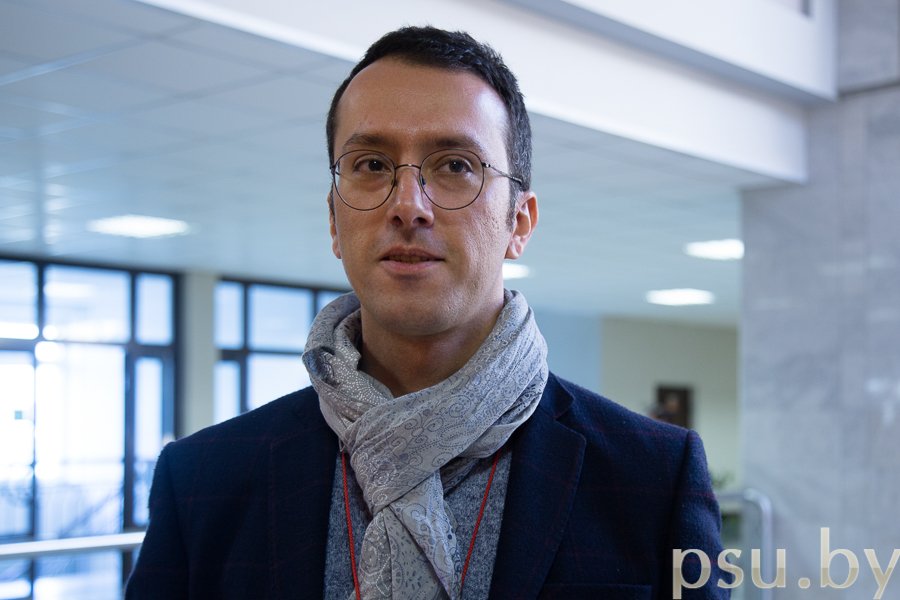
Svenja Haussner, researcher at the Faculty of Applied Phycology at SRH University Heidelberg (Heidelberg, Federal Republic of Germany): “The title of my report is “The Results of a Comparative Research of the Attitude to Crime and Punishment in Germany and Belarus”. We’ve carried out a survey and asked students about punishment. They were to choose whether to punish for crime or provide a therapy or rehabilitation. We also asked students in Belarus and Germany about their satisfaction with national actions and compared the results. It’s very important because public opinion has influence on policy for crime and crime prevention acts.
I wish to get acquainted with many people from Belarus and other countries and to learn new things about criminology. It’s my first time in Belarus and I love it! People are so nice. I think that PSU is a very modern university, and the students and lecturers are friendly and nice.”
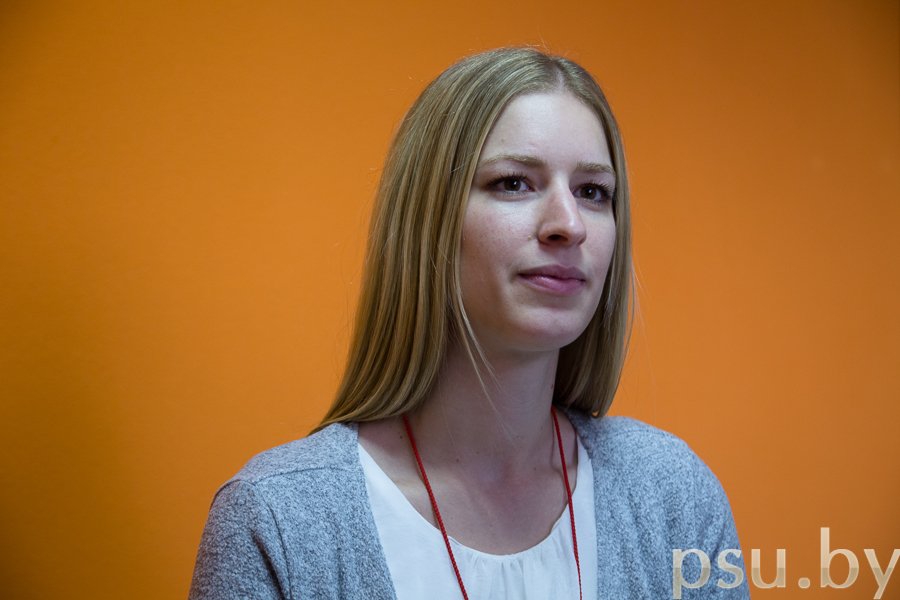
Helmut Kury, Doctor of Psychology, professor (Freiburg, Federal Republic of Germany): “Today, I will speak about different sorts and groups of punishment and the main question is whether it helps to reduce crime.
It is an international conference. A conference allows exchanging experience with researchers from different countries: Belarus, Russia, Iran, Germany, Ukraine and others. We have gathered today to learn from the congress, how different countries deal with crime and about the prevention of crime in their countries. We are here to learn from the international experience.
I was here, at PSU, one year ago. I should say that I like the organization of the conference. I was deeply impressed by the building itself, by a friendly atmosphere. Therefore I’m glad that I’m here and that I have an opportunity to compare the information, to get new results of what has been done.
A great advantage of the university is that it is very open to international cooperation. It is very useful for both you and the guests. We can learn also a lot from you. The beginning of a good cooperation!”
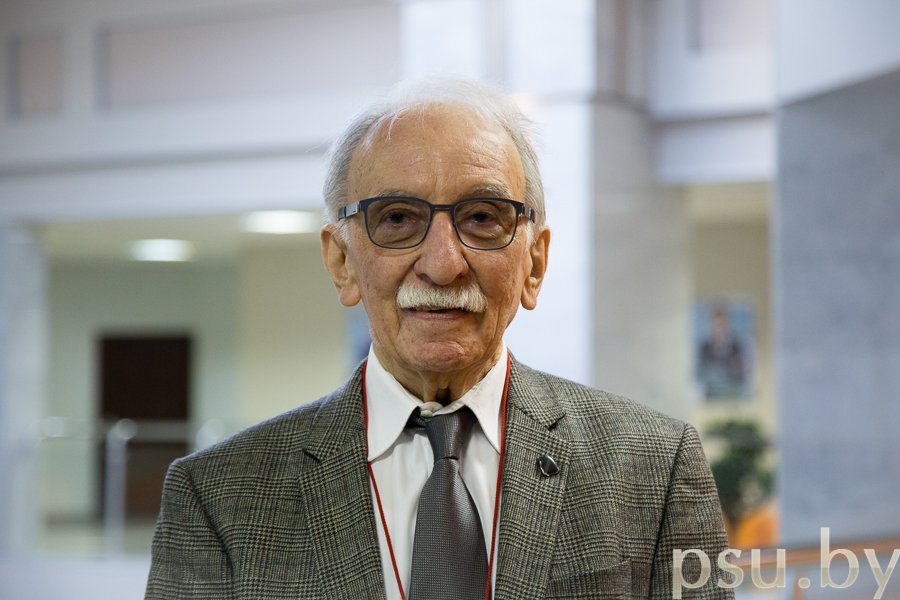
Summing up the results of the event, we can say that this conference is the result of our university staff efforts to enter the world educational and academic system. It is important not only for Polotsk State University, but also for the whole Belarusian criminology because it has provided the possibility to present the research results of Belarusian scientists to the regional and world scientific community. Besides, it has helped to strengthen the existing contacts and establish new ones. The next step of the international cooperation development is the publication of works both in the Russian and English languages, and the organization of a conference at the University of Heidelberg and at SRH University Heidelberg next spring. Besides, the ideas for new research and educational projects have appeared. We dare to hope, that the ideas will find support both at our university and among our partner universities.
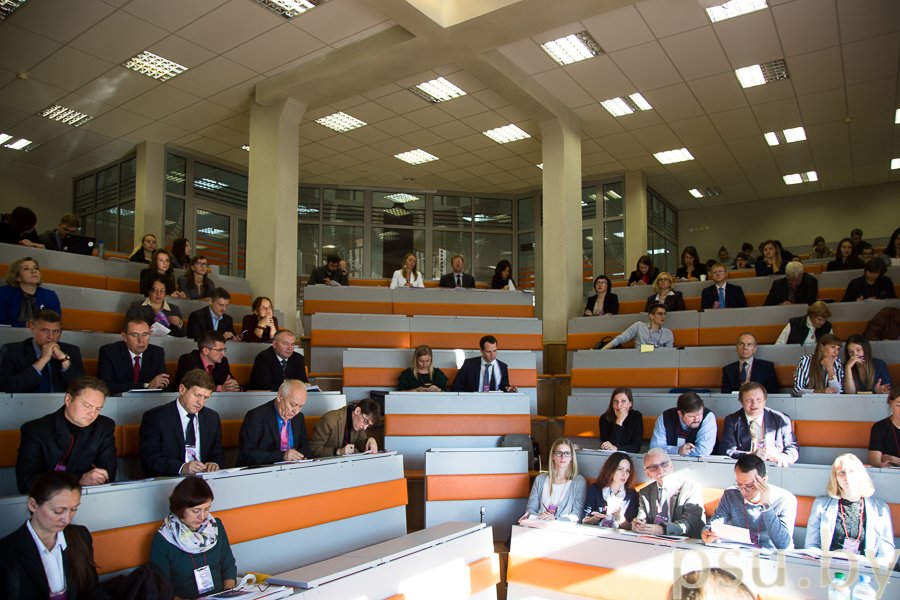
Yulia Prikolotina
Daria Alekseyeva
Photos by: Polina Kosarevskaya, Vladimir Krivoborodenko